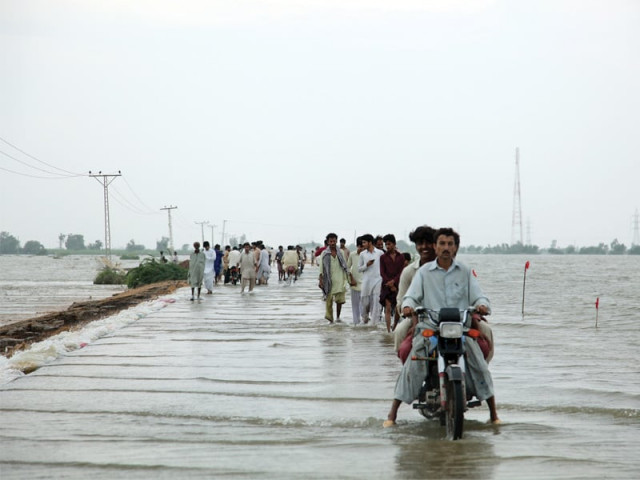When you lose everything, a tent becomes a luxury
Despite governments claims, little or no aid is reaching Badin.

“All my belongings including three goats have been washed away. Our house has collapsed. We are under the open sky. We are desperate for a tent.”
Raj Bai, an elderly woman, stands in front of Badin’s DCO House demanding a very basic right - a roof over her head. “Government officials are selling tents from Rs1,000 to Rs1,500.”
Raj Bai belongs to Haji Lahno Mallah village of the Badin district. She watched as the rain swept away belongings and every house and animal in her village. “There are 15 people in my family, all the children are suffering from gastroenteritis.” She leans heavily on her stick and tears roll down her face. “One of my grandsons died and others are in a bad condition.”
The union councils where the devastation was the worst were Seerani, Khoski, Dehi Jharks, Mithi Three, Nindo, Abdullah Shah, Tarai, Gharro, Kadhan, Bhugra Memon Ahmed Rajo, Lawari Sharif, Kario Ganhwar, Khadaro and Chhabralo. Here, every village bears marks of the destructive rains.
There is only one place to set up the tents - the main road heading to Tharparkar’s Mithi. People line this road waiting for the government, non-governmental organisations or donor agencies to notice them.
Some are busy shifting their livestock and families from the inundated land to the road. Others are pitching makeshift tents to serve as their new homes.
“It’s not only the rain,” said Hassan Mallah, the Khoski Town headmaster, “a breach occurred in the Left Bank Outfall Drain (LBOD) and other canals have also caused the havoc.”
According to Mallah, if government officials simply helped plug the breaches in the LBOD and canals, the situation could return to normal.
The ones who make it to the safe haven on the road are the lucky ones, in many villages of the Abdullah Shah union council near Khoski Town, hundreds of people are stranded in their homes and no efforts have been made to rescue them yet.
The people of Mataro Thebo, Lakho Dino Mallah, Pandhi Mallah, Jam Mallah, Notkhani, Mir Muhammad Lund were waiting for government help to rescue them.
Jam Mallah village, home to about 50 families, was an island surrounded by five to six feet water. The majority of the villagers have abandoned their homes but a few families are still stranded in their homes. The children are sitting on charpais (beds) almost submerged in rain water.
“A woman and her baby in our village died yesterday due to gastroenteritis. I fear for the future of my children who also have a fever,” said a woman, Hawa. “We will move today, but my husband says there is no space left on the road to set up a tent as it too has been submerged. I don’t know where we should go.”
The devastation has sent the settlement back to a primeval existence where their only concern is battling the elements and survival. “Snakes and other reptiles come from this water and we cannot sleep all night because of the mosquitoes.” The people have become extra paranoid since two children died of snake bites.
In the one-and-a-half hour drive from Badin to Khoski Town all the surrounding fields were submerged and not a single acre of crop land was spared.
“This is fertile land where people had grown cotton, sugarcane and rice. It has now become a big lake. People here suffer from different kinds of disasters, but whether it is a cyclone, flood or starvation, the government hasn’t bothered to put together a plan or other policies,” complained Aghar Leghari, one of the area’s social activists.
He claimed that 170,000 people had been displaced by a cyclone in 2007, 250,000 by heavy rain two years ago and 295,000 by floods in 2011. “The recent rain has affected around 1,373,156 people in five talukas - Matli, Golarchi, Talhar and Tando Bagho and Badin,” he said.
Meanwhile, the makeshift relief camps in government schools and dispensaries in Badin, Golarchi and Tando Bagho are plagued with bad hygiene and a lack of food.
Contrary to the obvious, government officials claimed to have provided relief goods to rain affected people. Director Operations Provincial Disaster Management Authority Director Syed Sajjad Hyder Shah told The Express Tribune that 80,000 ration bags have been sent so far and they are trying to send 40,000 more to affected districts.
He said that the authority has released 34,217 family ration packs, 1,390,000 bags of flour, 35,000 packs of lentils, 242,440 bottles of mineral water, 1,200 bottles of six litre mineral water, 39,000 packs of sugar and 20,750 packs of ghee worth about Rs100 million. As for as non-food items, 14,322 tents, 5,000 plastic mats, 11,000 mosquito nets and 100 jerry cans worth about Rs114 million have also been supplied to all districts.
For their part, the relief department claims to have supplied 1,000 family ration packs worth Rs1.5 million and 9,097 tents, 9,800 plastic mats, 525 mosquito sprays, 3,230 water purification units and 1,500 jerry cans worth Rs111 million.
Published in The Express Tribune, September 12th, 2011.



















COMMENTS
Comments are moderated and generally will be posted if they are on-topic and not abusive.
For more information, please see our Comments FAQ